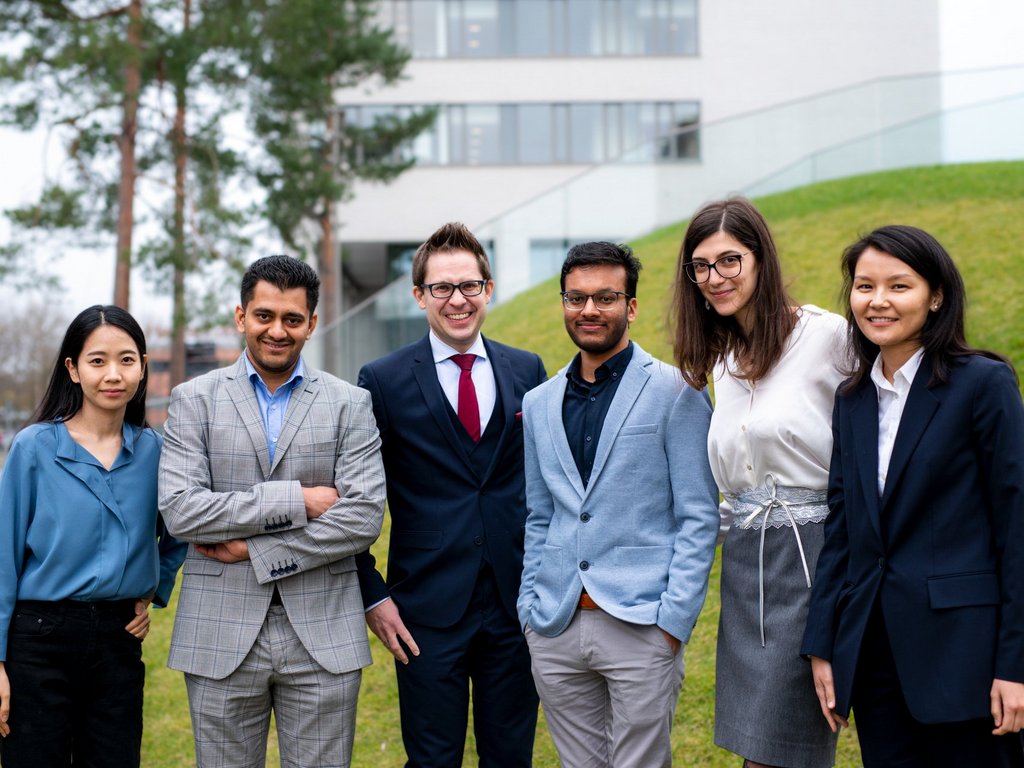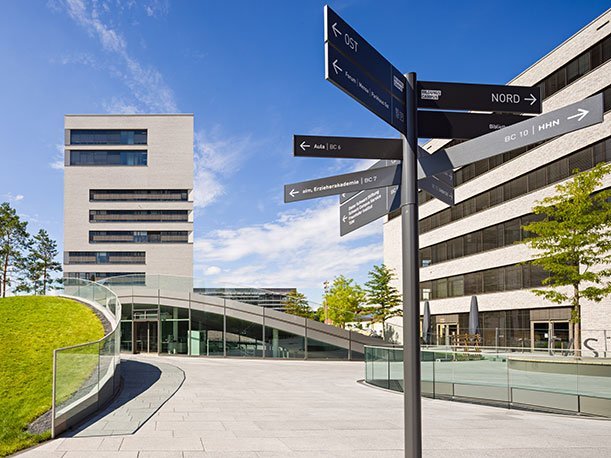

Our team is located at the TUM location in Heilbronn. We conduct research on topics in the area of supply chain management and we teach related courses. Supply chain management can broadly be defined as managing the interplay of different firms such as retailers, manufacturers, suppliers, and distributors that all seek to maximize the value of their supply chain by satisfying an end-customer’s needs.
We all in our team share a fascination for new and digital technology. We study its use in the managerial and operations context, we use it as inherent element in our studies, and we leverage digitalization to further improve our courses.
Welcome, to our website!
We conduct research in the area of supply chain and operations management. Our recent and ongoing research projects can be grouped into five related topics.

In order to derive insight systematically, we use a set of methods. Which specific method ultimately and most likely leads to novel findings depends on the specific research questions. Drawing from a wide range of methods covering both empirical and analytical approaches provides us with sufficient flexibility. Following the idea of “standing on the shoulders of giants”, our focus is on applying methods rather than their development.
MISSION
In our team, we plan, develop, implement, and evaluate various methods to improve our lectures and seminars. Using a participant-centric approach we use digital technology to facilitate better learning.
DIDACTIC METHODS AND TOOLS
Each course is heavily supported through e-learning with the platform Moodle, where we expect students to actively prepare classes by studying material online and answering quizzes. Using online video units in most of our courses, we seek to flip the classroom: students prepare substantially upfront – whereever and whenever they like. In the classroom, we make the best of our time by directly addressing open questions, discussing cases and providing individual feedback.
Of courses, there are also elements of classical lectures, where it is just us presenting. But we keep those to a minimum. Simulations are frequently used to foster more interactive learning. Most recently, we began our journey into the use of virtual reality in teaching. It has just begun, so currently all of our approaches are work in progress, as we would say in operations.
Prep-course Mathematics (Winter Semester): Mathematical training is important for students interested in management technology. Before joining TUM, students have various backgrounds and enjoy different levels of mathematical training. This prep course takes place before their first semester (first two weeks of October) and aims to convey basic skills. It is quite comprehensive giving a first impression how subsequent classes might look like. And, of course, it is the first opportunity to meet fellow students and get used to study life. The course is taught using blended learning with over 80 video units online that help students to benefit from the course also during the first semester.
To find the latest version of this course in Moodle, search for: "Prep Course Mathematics TUM-BWL (HN)".
Production and Logistics (Summer Semester): This course introduces bachelor students to production and logistics. We approach both topics from a quantitative perspective (e.g., models, algorithms) as well as from a qualitative method (e.g., frameworks). To foster an interactive and participant-centric teaching atmosphere, we will leverage simulations, discuss cases and have many further in-class activities and exercises.
To find the latest version of this course in Moodle, search for: "Production and Logistics (WI0010601HN) BMT Heilbronn".
Advanced Seminar Operations & Technology: Supply Chain Tactics & Strategy: This course prepares students to make tactical choices supporting organizational performance and strategy. To encourage active learning, a web-based business simulation game will be employed.
To find the latest version of this course in Moodle, search for: "Advanced Seminar Operations & Technology: Supply Chain Tactics & Strategy (MiM Heilbronn)".
Production and Logistics (Summer Semester): This course introduces students to production and logistics. We approach both topics from a quantitative perspective (e.g., models, algorithms) as well as from a qualitative method (e.g., frameworks). To foster an interactive and participant-centric teaching atmosphere, we will leverage simulations, discuss cases and have many further in-class activities and exercises.
To find the latest version of this course in Moodle, search for: "Production and Logistics (WI001131HN) MiM Heilbronn".
Advanced Seminar: Supply Chain Finance & Supply Chain Risk Management (Winter Semester): Upon completion of this module, students will prove their ability to communicate even complicated relationships and methods to their peer students through a presentation in a comprehensible fashion. The presentation including moderation of ensuing discussion accounts for 30% of the final grade. Students will be able to compare contributions of several studies, and to transfer theoretical concepts to practice through a seminar paper (70% of final grade). This method requires students to formulate an academic paper themselves; it can be seen as an exercise towards writing a master thesis.
To find the latest version of this course in Moodle, search for: "Advanced Seminar Operations & Supply Chain Management: Supply Chain Finance & Supply Chain Risk Management (MiM Heilbronn)".
If you are interested in writing your bachelor’s and master’s theses at the Professorship of Supply Chain Management at Campus Heilbronn, please find a list of theses topics on the Moodle page. If you already have an idea for a thesis topic, kindly send your proposal to Mrunal Mohadikar.
If you are interested in doing a project study under our supervision, kindly contact Prof. Dr. David Wuttke.
In the summer semester of 2021, due to the Coronavirus situation, we used virtual reality to a large extent in our classes as we were looking for new ways to teach fully online. Leveraging virtual reality gave us a great opportunity to move closer, meet, and discuss more interactively with the students in off-campus environments. We used EngageVR, an app developed by Immersive VR Education Ltd. In this app, we organize regular meetings, and students can participate in virtual classrooms using their avatars.
We have developed our own applications and simulations for teaching and research. We will use a version of the famous beer game in virtual reality, where students stand in a firm such as a brewery or a retailer and observe the rising inventory levels.
We started this project even before the Coronavirus pandemic, early in 2020. Corona played an accelerating role when we decided we did not want to have the same online format in the third “Corona-Semester,” but we wanted to evolve. After Corona, we seek to integrate VR more seamlessly into on-campus lectures, for instance, for students who cannot make it to the campus because they are currently at another TUM Campus or sick.
In addition, we have also created a series of 360-degree videos that can be watched on VR devices. Of course, all students need VR headsets. To achieve this, we have identified suitable hardware, procured a large number of devices, and lend them to our students in Heilbronn, who participate in VR-based classes. While we believe in the importance of VR in education even after Corona, we very much look forward to teaching on-campus and meeting personally with our students.

Prof. Dr. David Wuttke is an Assistant Professor of Supply Chain Management at the TUM School of Management at the Heilbronn Campus since January 2020.
His research interests are in the area of Supply Chain Management. He teaches in executive education programs as well graduate and undergraduate programs. He builds on interaction with students and leverages digital teaching formats such as virtual classrooms, blended-learning, and flipped classrooms. Currently, he is evaluating the use of virtual reality devices for even more advanced digitally supported classes.